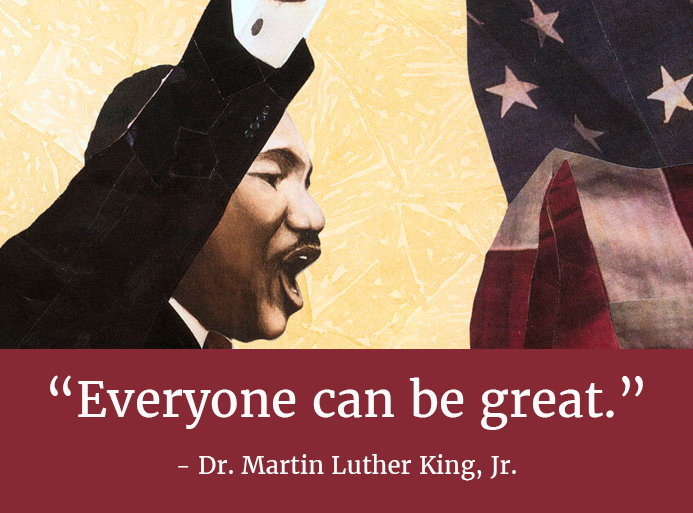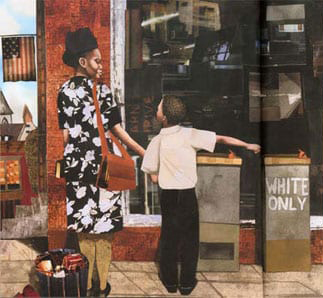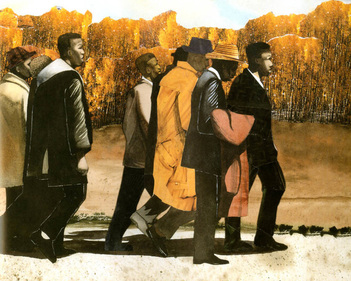Peace is Like Martin Luther
See all blog posts
By Sunita Pereira and Mary Nolin
 April is National Poetry Month, a time to recognize and celebrate the importance of poets and their poetry in our history, culture, and everyday lives. Adult English as a Second Language (ESL) students at the International Institute of New England (IINE) in Manchester have been using and writing their own poems to learn English. They also read the book Martin’s Big Words: The Life of Dr. Martin Luther King Jr. by Doreen Rappaport as part of their ongoing Connections book discussion series.
April is National Poetry Month, a time to recognize and celebrate the importance of poets and their poetry in our history, culture, and everyday lives. Adult English as a Second Language (ESL) students at the International Institute of New England (IINE) in Manchester have been using and writing their own poems to learn English. They also read the book Martin’s Big Words: The Life of Dr. Martin Luther King Jr. by Doreen Rappaport as part of their ongoing Connections book discussion series.
 Sunita Pereira, ESL teacher at IINE and Connections facilitator, said “At IINE we enhance our curriculum by using some of the lesson plans from Minnesota Literacy Council. There is one on poetry writing by introducing adjectives. The lesson was very simple.” Poetry is a great way to encourage adult students to learn new vocabulary and create sentences. Through creative writing, listening, and reading, exploring poetry promotes teamwork and the satisfaction of having created a poem. It also gives the students a chance to talk about poems they love from their native languages; to share their rich culture and their favorite authors or poets with their colleagues in class.
Sunita Pereira, ESL teacher at IINE and Connections facilitator, said “At IINE we enhance our curriculum by using some of the lesson plans from Minnesota Literacy Council. There is one on poetry writing by introducing adjectives. The lesson was very simple.” Poetry is a great way to encourage adult students to learn new vocabulary and create sentences. Through creative writing, listening, and reading, exploring poetry promotes teamwork and the satisfaction of having created a poem. It also gives the students a chance to talk about poems they love from their native languages; to share their rich culture and their favorite authors or poets with their colleagues in class.
Students started a poem about themselves by answering simple questions:
1. What is your first name?
2. What is your last name?
3. What adjectives describe you?
4. What do you like?
5. What are you afraid of?
6. What do you need?
 Once students finished writing and sharing poems answering those questions, they could then explore other poems on more complex ideas like school, life in America, and peace.
Once students finished writing and sharing poems answering those questions, they could then explore other poems on more complex ideas like school, life in America, and peace.
After reading a poem about peace, one student commented that it reminded her of Dr. Martin Luther King from the Connections book they read in late January. “That was it. I took the opportunity to expand on it ,” said Sunita. “ I wrote the simple questions on the board: What is peace? What does it look like? What does it sound like? How does it make you feel? How do you get peace?”
The students wrote their ideas down and each one contributed ideas in a google document on Zoom. Together they chose the sentences, while Sunita wrote them down. The result was this simple, yet powerful poem.
Peace Group Poem
Peace is like Martin Luther,
Peace looks like his march,
It sounds like pain,
Sometimes it is frustrating,
Peace is always praying.
- Alla, Yuri, Rachana, and Esperanza
When asked to explain the benefits of writing poetry in the classroom with students, Sunita responded with this:
“This just goes to show that not only the students, but even the teachers, benefit from this simple exercise. Not to mention the satisfaction a teacher gets when students are able to connect a feeling to a Connections book they have read!”
For a printable version of this story, click HERE.
To read more articles in the Connections blog, please click HERE.